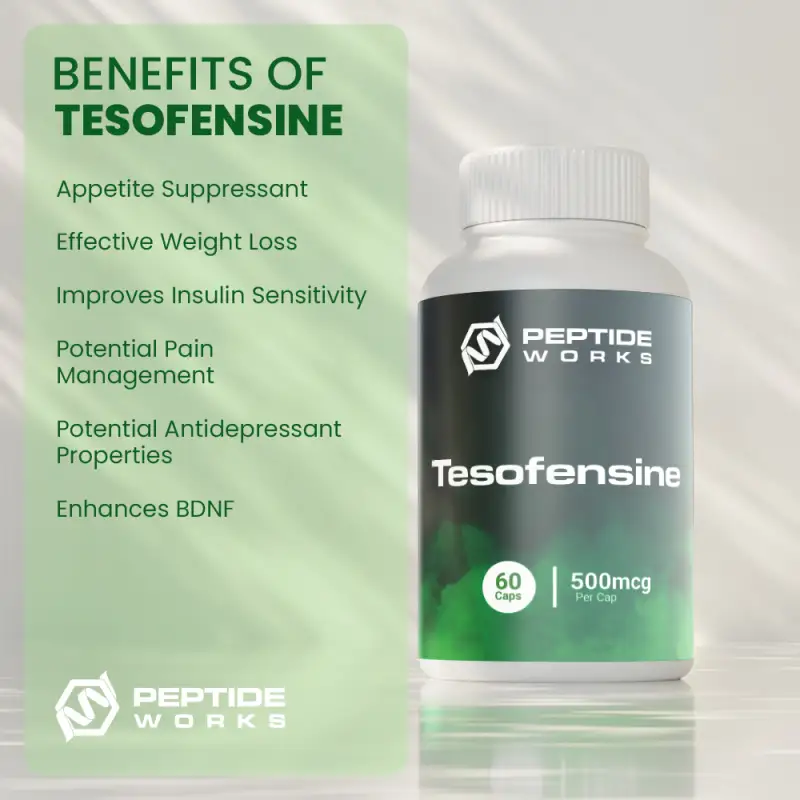PROMO!
First order? Get 10% OFF with this code: 1storder
Our Product Categories
Tesofensine is an experimental pharmaceutical agent classified as a phenyltropane derivative and a potent triple monoamine reuptake inhibitor. It works by presynaptically blocking the reuptake of serotonin, norepinephrine, and dopamine, thereby increasing their availability in the brain.
Originally explored as a treatment for neurodegenerative conditions like Parkinson’s and Alzheimer’s, its development took a new direction after showing a strong effect on appetite suppression. Clinical trials have shown it to be highly effective for significant weight loss, making it a promising option for treating obesity. Its main therapeutic effect is a powerful reduction in hunger and increased satiety.
Sequence (IUPAC Condensed): It is not classified as a peptide.
Molecular Formula: C17H23Cl2NO
Molecular Weight: 328.3 g/mol
View the Tesofensine Certificate Of Analysis (COA)
View the Tesofensine High Performance Liquid Chromatography (HPLC)

Tesofensine operates as a potent, presynaptic triple monoamine reuptake inhibitor. By blocking the transporter proteins for serotonin (SERT), norepinephrine (NET), and dopamine (DAT), it increases the extracellular concentrations of these key neurotransmitters in the brain’s synaptic cleft.
This simultaneous elevation of serotonin, norepinephrine, and dopamine modulates the neural circuits controlling appetite and satiety, particularly within the hypothalamus. Together, these effects significantly reduce hunger and increase feelings of fullness. This strong appetite suppression helps lower calorie intake, which is the main reason for the significant weight loss seen in studies.
Buy Tesofensine Capsules from Peptide Works. Each bottle contains 60 capsules, with 500mcg (0.5mg) per capsule.
Weight Loss in Obese Patients: Research shows that Tesofensine, a triple monoamine reuptake inhibitor, induces marked dose-dependent weight loss in obese patients. In a 24-week trial, tesofensine combined with a calorie-restricted diet resulted in weight reductions of 4.5%, 9.2%, and 10.6% for doses of 0.25 mg, 0.5 mg, and 1.0 mg, respectively, compared to 2.0% with placebo [1].
Preclinical studies reveal that tesofensine suppresses feeding behavior by modulating GABAergic neurons in the lateral hypothalamus, prolonging weight loss and preventing rebound, making it a promising obesity treatment [2].
Improved Body Composition and Metabolism: Research suggests that Tesofensine improves body composition and metabolism by promoting significant weight loss and enhancing fat oxidation. In clinical trials, tesofensine induced up to 10.6% weight loss over 24 weeks, outperforming current weight-loss drugs [1].
It increased satiety, reduced prospective food intake, and elevated nighttime energy expenditure when adjusted for body composition. Additionally, tesofensine boosted 24-hour fat oxidation, highlighting its potential to improve metabolic health and support effective obesity management [3].
Appetite Suppression and Increased Energy Expenditure: Tesofensine research has shown that it suppresses appetite and increases energy expenditure through its effects on norepinephrine, serotonin, and dopamine pathways. In diet-induced obese (DIO) rats, tesofensine significantly reduced food intake and body weight by stimulating α1 adrenoceptor and dopamine D1 receptor activity [4].
It also normalized reduced dopamine levels in the nucleus accumbens and prefrontal cortex, reversing obesity-related dopaminergic deficits. These mechanisms highlight tesofensine’s potential as a powerful anti-obesity treatment [5].
Investigated for Neurological Indications: Tesofensine has been investigated for the potential treatment of neurological conditions, including Parkinson’s disease (PD). In early PD, tesofensine showed initial improvement in motor function (UPDRS scores) at higher doses, but the effect was not sustained. In advanced PD, modest improvements in motor function and reduced “off” time were observed, particularly at 0.25–0.5 mg doses. However, no clear dose-response relationship was established, and higher doses were associated with increased adverse effects [6].
[1] A Astrup, S Madsbad, L Breum, et al (2008) Effect of tesofensine on bodyweight loss, body composition, and quality of life in obese patients: a randomised, double-blind, placebo-controlled trial – Lancet, 2008 Nov 29, Volume 372 (Issue 9653), Pages 1906-1913.
[2] C I Perez, J Luis-Islas, A Lopez, et al (2024) Tesofensine, a novel antiobesity drug, silences GABAergic hypothalamic neurons – PLoS One, 2024 Apr 24, Volume 19 (Issue 4), Page e0300544.
[3] A Sjödin, C Gasteyger, A-Lh Nielsen, et al (2010) The effect of the triple monoamine reuptake inhibitor tesofensine on energy metabolism and appetite in overweight and moderately obese men – Int J Obes (Lond), 2010 Nov, Volume 34 (Issue 11), Pages 1634-43.
[4] A M D Axel, J D Mikkelsen & H H Hansen (2010) Tesofensine, a Novel Triple Monoamine Reuptake Inhibitor, Induces Appetite Suppression by Indirect Stimulation of α1 Adrenoceptor and Dopamine D1 Receptor Pathways in the Diet-Induced Obese Rat – Neuropsychopharmacology volume 35, pages1464–1476 (2010).
[5] H H Hansen, M M Jensen, A Overgaard, et al (2013) Tesofensine induces appetite suppression and weight loss with reversal of low forebrain dopamine levels in the diet-induced obese rat – Pharmacology, Biochemistry & Behavior, 2013 Sep, Volume 110, Pages 265-71.
[6] O Rascol, W Poewe, A Lees, et al (2008) Tesofensine (NS 2330), a monoamine reuptake inhibitor, in patients with advanced Parkinson disease and motor fluctuations: the ADVANS Study – Arch Neurol, 2008 May, Volume 65 (Issue 5), Pages 577-83.
The answers to the most frequently asked questions about Tesofensine.

Tesofensine works by reducing appetite and promoting a stronger sense of fullness. Research indicates it may cause a slight rise in metabolic activity during rest, but most of its observed effects come from lowered food intake. It acts on brain pathways that regulate hunger and energy balance, suggesting appetite control is its main mechanism rather than major metabolic stimulation.
Tesofensine acts on brain chemicals that influence focus, mood, and alertness. It blocks the reuptake of dopamine, norepinephrine, and serotonin neurotransmitters linked to energy and motivation. Research indicates it may support healthy brain signaling and neural activity. However, current studies focus mainly on its role in appetite control and weight regulation rather than direct improvement of memory or learning performance.
Research shows Tesofensine can cause stimulant-like effects. Reported reactions include increased heart rate, higher blood pressure, dry mouth, trouble sleeping, nausea, and mild anxiety. These effects occur because it raises levels of brain chemicals that control mood and alertness. Studies note that side effects often depend on dosage, with stronger reactions seen at higher levels during research testing.
Tesofensine is not approved by the U.S. Food and Drug Administration (FDA) for medical use. It is classified as a research compound and can be obtained legally in the United States only for laboratory or research purposes. Laws and regulations for peptides vary from region to region, so following local guidelines is important before purchasing or conducting any research.

This blog explains the science behind weight loss peptides and how they may help with weight management. It focuses on Tesofensine, AOD-9604, and FTPP, describing their effects on appetite, fat metabolism, and how the body regulates fat tissue. With findings from ongoing research, the post gives a clear view of these innovative compounds.

This blog explores the science behind peptides like Tesofensine, AOD-9604, FTPP and Tesamorelin in appetite control and weight management. It highlights Tesofensine’s neurotransmitter based hunger regulation, compares it with fat metabolism-focused peptides, and examines their unique roles in research. Discover how these compounds shape the future of appetite control and fat loss studies.

This blog explains the science behind Tesamorelin, a peptide that targets belly fat through growth hormone pathways. It also compares Tesamorelin with Tesofensine, another fat-reducing peptide, showing how each affects fat use, metabolism, and body composition. The post shares research insights, benefits, and what future studies may reveal.
ALL CONTENT AND PRODUCT INFORMATION AVAILABLE ON THIS WEBSITE IS FOR EDUCATIONAL PURPOSES ONLY.
DISCLAIMER: These products are intended solely as a research chemical only. This classification allows for their use only for research development and laboratory studies. The information available on our Peptide Works website: https://peptide-works.com/ is provided for educational purposes only. These products are not for human or animal use or consumption in any manner. Handling of these products should be limited to suitably qualified professionals. They are not to be classified as a drug, food, cosmetic, or medicinal product and must not be mislabelled or used as such.